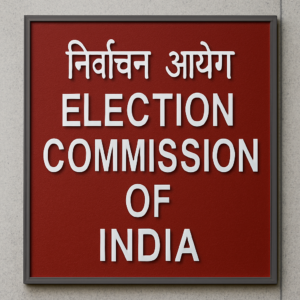
The Election Commission of India (ECI) is an independent constitutional authority responsible for administering elections in India at the national and state levels. It ensures that elections are conducted in a free, fair, and transparent manner.
1. Constitutional Status
- Established: 25 January 1950 (celebrated as National Voters’ Day in India)
- Constitutional Basis: Article 324 of the Indian Constitution grants the ECI the power to direct, control, and conduct elections to:
- Parliament (Lok Sabha & Rajya Sabha)
- State Legislatures (Vidhan Sabha & Vidhan Parishad)
- The offices of President and Vice-President of India

2. Structure
Chief Election Commissioner (CEC) – Head of the ECI
Election Commissioners – Usually two other members along with the CEC
Appointed by the President of India
Tenure: Up to 6 years or until the age of 65, whichever is earlier
3. Functions
Preparing and updating electoral rolls
Scheduling and conducting elections
Granting recognition to political parties and allotting symbols
Monitoring political party election expenses
Ensuring the Model Code of Conduct is followed
Introducing and overseeing electronic voting machines (EVMs) and Voter Verifiable
Paper Audit Trail (VVPAT) systems
DIGI MERCH STORE PRINT ON DEMAND

4. Powers
Supervisory control over the entire election process
Can disqualify candidates for corrupt practices
Can postpone or cancel elections in case of malpractice or violence
Issues guidelines to maintain the integrity of elections
5. Significance
Ensures democratic governance in India
Maintains people’s faith in the electoral process
Acts as a neutral referee between political parties
freeandfairelections.
ModelCodeofConduct.
RahulGandhiCongress.
Comment:
















Взлетай с Лаки Джет — удобная регистрация и игра без риска.